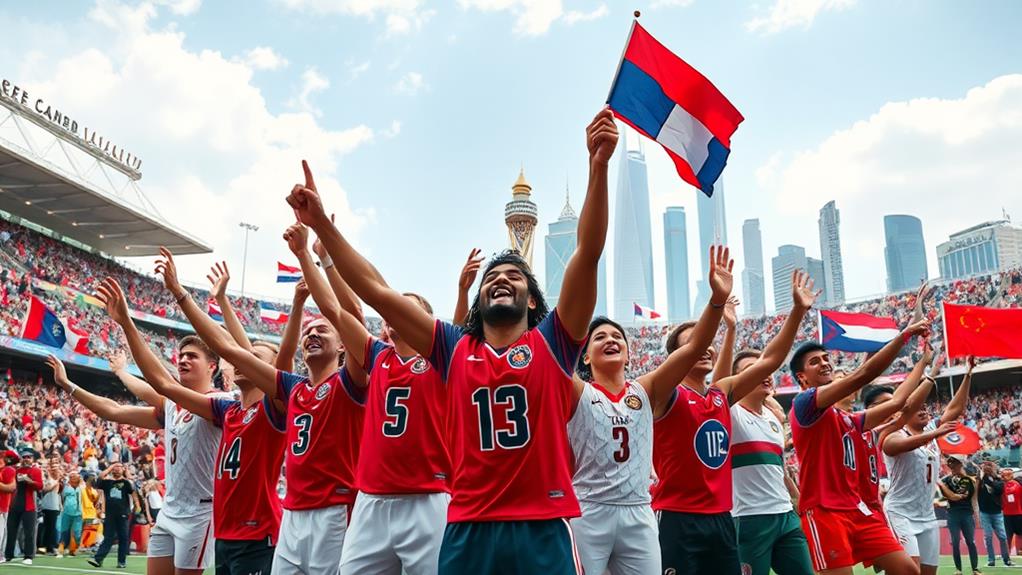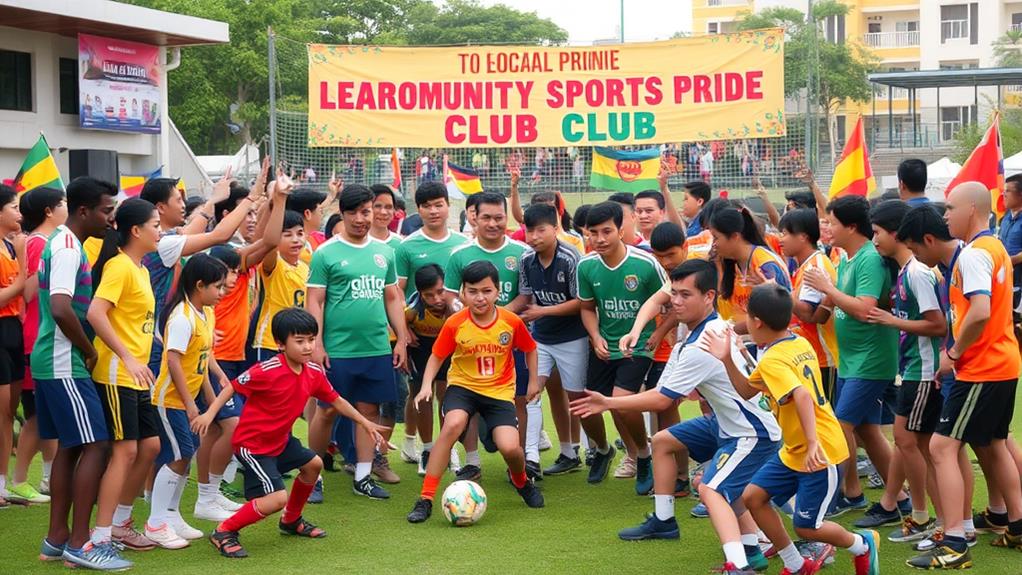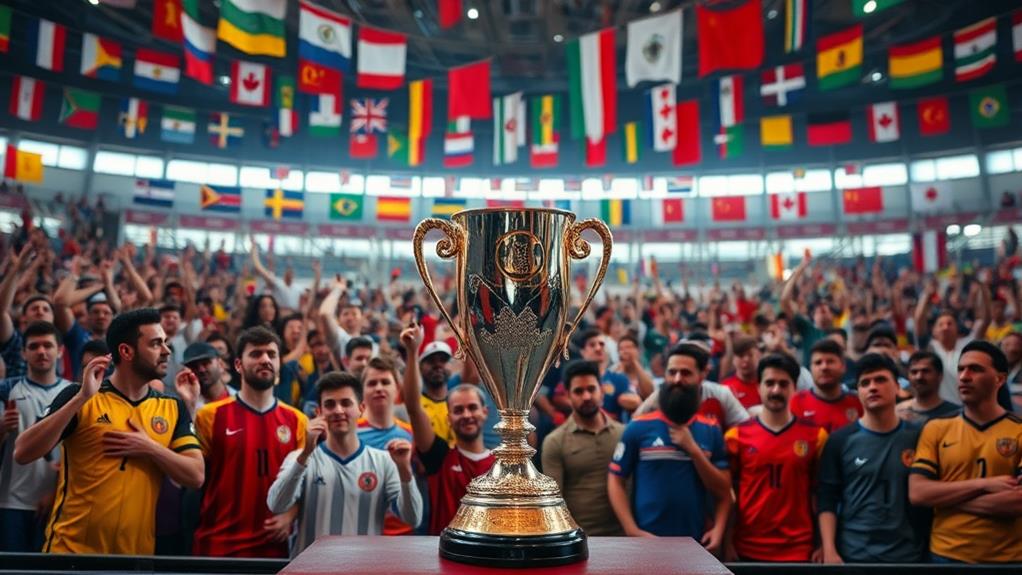Sports unify people across different backgrounds through shared experiences. When a team wins, people celebrate together, reinforcing their bonds and collective identity. For example, during the 2018 FIFA World Cup, people from different racial and ethnic groups in France came together to cheer on their national team, fostering a sense of unity and national pride.
Major international sports events symbolize cultural values and historical narratives. The 1995 Rugby World Cup in South Africa, for instance, marked a significant moment in the country's transition to democracy, demonstrating the power of sports to bring people together and promote national unity.
Local sports clubs strengthen community identity, while global competitions elevate national pride. The presence of local sports clubs in neighborhoods helps to build a sense of community, as people from the same area come together to support their team.
On a larger scale, international competitions like the Olympics allow countries to showcase their athletic achievements and promote national pride.
The relationship between sports and nationalism can be complex, influencing societal cohesiveness. While sports have the power to unite people, they can also be used to divide and exclude others.
It is essential to recognize both the positive and negative impacts of sports on national unity and pride.
The Impact of Sports on National Identity

Sports play a crucial role in shaping national identity. When national teams compete internationally, they ignite a sense of national pride that transcends political and socioeconomic divides. This collective pride is evident in the celebrations that erupt after a hard-fought victory, fostering unity among citizens and strengthening national bonds.
Sports embody a nation's cultural values and historical narratives. They reinforce a shared identity through performances that resonate deeply with the populace. For example, South Africa's 1995 Rugby World Cup victory symbolized a new era of unity following apartheid, demonstrating how success in sports can elevate national identity.
Major sporting events provide platforms for nations to showcase their culture and values, enhancing their global image. The 2008 Beijing Olympics, for instance, allowed China to display its rich cultural heritage and values to a global audience.
This visibility instills a sense of belonging among citizens, prompting increased civic engagement as they rally behind their athletes. As citizens come together to support their team, they contribute to social cohesion, reinforcing the idea that sports are vital threads in the tapestry of national identity.
Sports as a Unifying Force
Sports Unite People Across Differences
Sports have the power to bring people together, fostering a sense of solidarity that transcends individual differences. International sporting events, like the FIFA World Cup and the Olympics, become platforms for national pride, where citizens celebrate their athletes' achievements and share a collective identity.
The impact of sports on unity is evident in various events:
| Event | Impact on Unity |
|---|---|
| 1995 Rugby World Cup | United diverse ethnic groups in South Africa |
| 2008 Beijing Olympics | Promoted statehood and national image |
| FIFA World Cup | Celebrated national achievements globally |
| Local Sports Events | Encouraged collaboration among communities |
| Paralympics | Highlighted inclusivity and diversity |
These events demonstrate how sports can break down barriers between communities, fostering a sense of belonging. The shared experience of cheering for a national team can bridge political and socioeconomic divides, uniting people in collective celebrations.
Role of Clubs in Community Identity

Clubs play a significant role in shaping community identity by reflecting the values, history, and aspirations of their local populations.
Athletic Bilbao's policy of fielding only Basque players, for instance, reinforces Basque nationalism and fosters pride within the community.
Similarly, the Old Firm derby in Glasgow highlights the deep-rooted Catholic and Protestant ties, showcasing how local clubs can mirror historical rivalries and social divisions.
FC Barcelona, known as "Barça," serves as a potent symbol of Catalonian pride, with its motto "Més que un club" emphasizing its integral role in the region's cultural landscape.
NK Dinamo Zagreb and Red Star Belgrade represent Croatian and Serbian nationalism, respectively, embodying the ethnic tensions that shape their communities.
The Montreal Canadiens stand as a significant representation of Francophone identity in Quebec, with their storied history and rivalries enhancing the cultural fabric of French-speaking Canadians.
In essence, local clubs aren't just about sport; they forge community identity, bridging unity amid social divisions, and fostering a sense of belonging that transcends mere athletic competition.
How does Sportsmanship and Fair Play Contribute to National Unity and Pride in Sports?
Sportsmanship is the cornerstone of fair play in sports. The importance of sportsmanship lies in its ability to cultivate national unity and pride in sports. When athletes uphold fair play, it fosters a sense of camaraderie and respect among competitors, ultimately contributing to a strong and unified national sports community.
Global Sporting Events and National Pride
Global Sporting Events Unite Nations
Local sports clubs play a vital role in community identity, but global sporting events like the FIFA World Cup and the Olympic Games take national pride to a whole new level. These events unite citizens in support of their teams, transcending socio-political differences and fostering national solidarity.
The FIFA World Cup is a prime example of this phenomenon. 80% of participants reported feeling a strong sense of national pride during the tournament. This is evident in the 1995 Rugby World Cup in South Africa, where the national team's victory became a cornerstone for collective identity, bridging ethnic divides and promoting national unity.
The Olympic Games also serve as a platform for countries to showcase their cultural heritage. Athletes' achievements are celebrated as national milestones, highlighting the country's cultural identity. The 2008 Beijing Olympics, for instance, showcased China's rich cultural heritage to the world.
Global sporting events have a profound impact on national pride:
| Event | Key Impact | Example |
|---|---|---|
| FIFA World Cup | Surge in national pride | 1995 Rugby World Cup, SA |
| Olympic Games | Showcase of cultural identity | 2008 Beijing Olympics |
| Global Competitions | Fostering national solidarity | Various international events |
In essence, global sporting events celebrate athleticism while strengthening national bonds.
Challenges of Nationalism in Sports

Nationalism in sports can be a double-edged sword, fuelling both unity and conflict.
While sports have the power to unite a nation, they can also be exploited for political gain, leading to tension and conflict. For instance, the intense cricket matches between India and Pakistan often spark unrest, overshadowing the importance of sports as a means of building relationships.
Historical events have demonstrated how nationalism can disrupt international sporting events. The Olympic boycotts of 1980 and 1984 are prime examples of how nationalism can reflect broader geopolitical conflicts. Similarly, events like the Ashes series serve to intensify historical rivalries, with fans fostering a sense of superiority that can alienate rival supporters.
Nationalism in sports can lead to the exclusion of minority groups. In Ireland, Gaelic sports have historically marginalized players from British origins.
Even team sports can become battlegrounds for divisions, as seen in the Old Firm derby in Glasgow, where religious affiliations create intense community rivalries.
Ultimately, nationalism in sports presents a duality that society must navigate carefully. While sports can promote unity, the challenges of nationalism often complicate this ideal, revealing a more complex reality.
Questions and Answers
What Is the Role of Sports in Unity?
Sports foster unity by promoting community engagement and cultural exchange. When individuals participate in team sports, they share experiences that build social cohesion and create a collective identity.
For instance, playing on a local soccer team can bring together people from different neighborhoods, fostering a sense of community and shared purpose.
Team sports enhance emotional connections and strengthen local and national identity. As teammates work together towards a common goal, they develop strong bonds and a sense of belonging.
This collective identity can also extend to national pride, as seen during international competitions like the Olympics or World Cup.
Youth development through sports encourages global participation and collaboration. Programs like the Olympics' Youth Olympic Games or the FIFA World Youth Cup bring together young athletes from diverse backgrounds, allowing them to collaborate, learn from each other, and celebrate their achievements together.
This helps strengthen bonds within communities and promotes global understanding.
Sports ultimately strengthen community bonds and promote unity. By providing a platform for people to come together, share experiences, and celebrate achievements, sports play a crucial role in fostering unity and promoting social cohesion.
What Is the Role of Games in National Unity?
Games Foster National Unity
Games play a vital role in fostering national unity by promoting community engagement and identity formation.
They bring people together, encouraging cultural exchange and allowing diverse groups to connect through shared experiences, such as watching a national team compete in an international tournament.
International Competitions Ignite Patriotism
International competitions ignite patriotism, involving youth development and instilling values of teamwork and resilience.
For example, the Olympics bring together athletes from different countries, promoting unity and national pride.
Economic Impact and Health Benefits
The economic impact of these events generates volunteer involvement and enhances social cohesion, all while offering health benefits that unite people in active participation and collective celebration.
How Does Sport Unify Us?
Sport Fosters Unity Through Shared Experiences
Sport unifies us by creating shared experiences that bring people together, regardless of their individual differences. For instance, during international competitions, athletes and spectators from diverse backgrounds come together, promoting cross-cultural understanding and exchange. This shared experience strengthens community bonds and fosters a sense of togetherness.
Emotional Connections and Inclusivity
The emotional connection formed during games contributes to identity formation, as fans share joy and disappointment together.
Healthy rivalry dynamics also promote inclusivity, as teams and fans from different backgrounds engage in respectful competition. This inclusivity factor helps break down social barriers, uniting people across different demographics.
Youth Engagement and Sense of Belonging
Youth engagement in sports plays a crucial role in nurturing future generations' sense of belonging. As young athletes participate in team sports, they develop a sense of identity and belonging, which is essential for their social and emotional development.
Historical Significance and Unity
The historical significance of sporting events strengthens ties among people, showcasing sport's unique ability to bring us together.
For example, the Olympic Games have a long history of promoting international unity and understanding, bridging cultural and national divides.
What Is the Relationship Between Sport and Peace?
Sport plays a vital role in promoting peace by resolving conflicts and integrating societies. Through community engagement in sports, cultural exchange is fostered, enhancing international diplomacy.
For instance, the Olympic Truce Foundation brings together nations to promote peaceful resolution of conflicts during the Olympic Games.
Sport empowers youth and promotes gender equality, creating opportunities for all. The United Nations uses sports to engage youth in peacebuilding efforts, providing a platform for their voices to be heard.
Additionally, organizations like Women Win promote gender equality through sports, empowering girls and women worldwide.
Sports contribute to health promotion and economic development, providing educational opportunities for marginalized groups. The World Health Organization uses sports to promote physical activity, reducing the risk of chronic diseases.
Furthermore, sports tourism generates revenue, creating jobs and stimulating local economies.
By participating in sports, individuals help build bridges, reduce stereotypes, and nurture understanding, making a significant impact on peacebuilding efforts. Sports have the power to bring people together, fostering a sense of community and mutual respect.